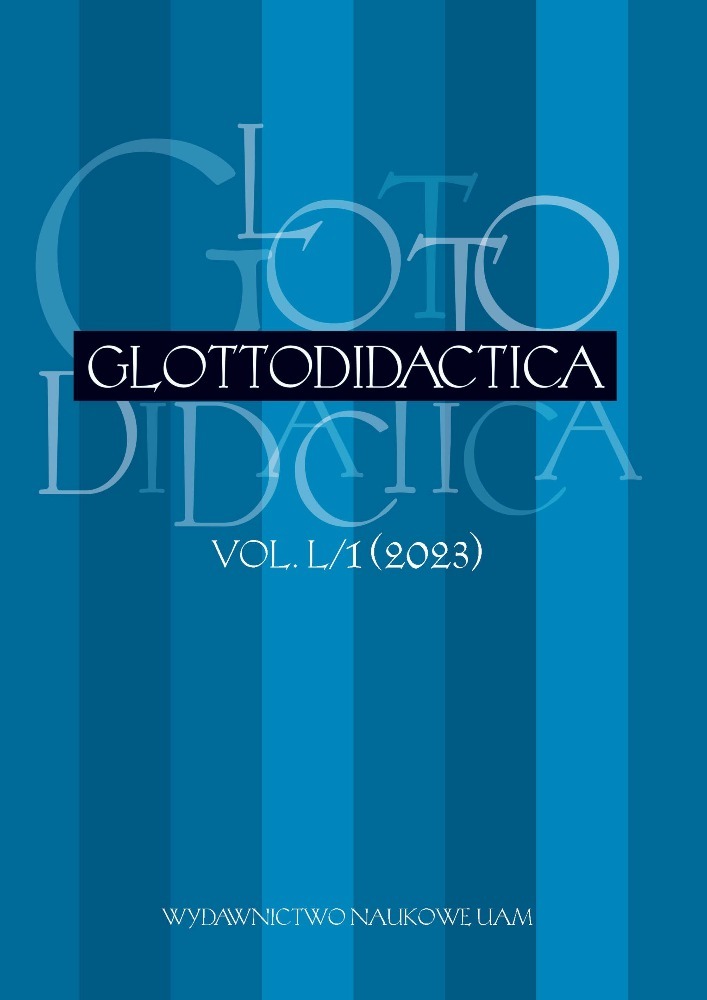Abstrakt
Institutional and family support for multilingual development. Issue under the auspices of the MaMLiSE project (Majority and Minority Languages in School Environment: Helping teachers, pupils and parents) https://mamlise.amu.edu.pl/
Bibliografia
Ballweg, S. (2022). Anticipating expectations. Family Language Policy and its orientation to the school system. International Journal of Multilingualism, 19 (2), 251–268. DOI: https://doi.org/10.1080/14790718.2022.2033756
Ballweg, S. / Havkic, A. (2022). Sprachaneignung und mehrsprachige Praktiken in ihrer sozi- alen Situiertheit. Einige Überlegungen zum Zusammenspiel von Deutsch als Fremd- und Zweitsprache und soziolinguistischer Mehrsprachigkeitsforschung. In: M. Pieklarz-Thien / DOI: https://doi.org/10.14220/9783737013789.25
S. Chudak (eds.), Wissenschaften und ihr Dialog in der Forschung zum Lehren und Lernen fremder Sprachen (pp. 25–52). Göttingen: Vandenhoeck & Ruprecht.
Bezcioglu-Göktolga, I. / Yağmur, K. (2018a). Home language policy of second-generation Turkish families in the Netherlands. Journal of Multilingual and Multicultural Development, 39 (1), 44–59. DOI: https://doi.org/10.1080/01434632.2017.1310216
Bezcioglu-Göktolga, I. / Yağmur, K. (2018b). The impact of Dutch teachers on family language policy of Turkish immigrant parents. Language, Culture and Curriculum, 31, 220–234. DOI: https://doi.org/10.1080/07908318.2018.1504392
Carvalho, M. (2001). Rethinking family-school relations. A critique of parental involvement in schooling. New York / London, England: Routledge. DOI: https://doi.org/10.4324/9781410600332
Daase, A. (2017). Heteroglossische Subjektivitäten im Übergang – Sprachlichkeit aus der Subjekt- perspektive. In: A. Daase / U. Ohm / M. Mertens (eds.), Interkulturelle und sprachliche Bildung im mehrsprachigen Übergang Schule-Beruf (pp. 109–134). Münster: Waxmann.
Gogolin, I. / Lange, I. (2010). Durchgängige Sprachbildung. Eine Handreichung. Münster: Waxmann.
Green, D. (1998). Mental control of the bilingual lexico-semantic system. Bilingualism: Language and Cognition, 1, 67–81. DOI: https://doi.org/10.1017/S1366728998000133
Grosjean, F. (1989). Neurolinguists, beware! The bilingual is not two monolinguals in one person. Brain and Language, 26, 3–15. DOI: https://doi.org/10.1016/0093-934X(89)90048-5
Grosjean, F. (2001). The bilingual’s language modes. In: J.L. Nicol (ed.), One mind, two languages: Bilingual language processing (pp. 1–22). Hoboken, NJ: Wiley-Blackwell.
Kirsch, C. / Aleksić, G. / Mortini, S. / Andersen, K. (2020). Developing multilingual practices in early childhood education through professional development in Luxembourg. International Multilingual Research Journal, 14 (4), 319–337. DOI: https://doi.org/10.1080/19313152.2020.1730023
Mary, L. / Young, A. (2020). Teachers’ beliefs and attitudes towards home languages maintenance and their effects. In: A. Schalley / S. Eisenchlas (eds.), Handbook of home language maintenance and development. Social and affective factors (pp. 444–463). Berlin et al.: De Gruyter Mouton. DOI: https://doi.org/10.1515/9781501510175-022
Masterson, M. (2017). Perception of the self and other and the role of language: An exploratory qualitative study. Frankfurt (a. M.): Peter Lang. DOI: https://doi.org/10.3726/b11441
Rokita-Jaśkow, J. / Wolanin, A. / Król-Gierat, W. / Nosidlak, K. (2022). Bridging the ‘dual lives’: School socialization of young bi/multilinguals in the eyes of EFL teachers. International Journal of Bilingual Education and Bilingualism, 26 (4), 395–410. . DOI: https://doi.org/10.1080/13670050.2022.2114788
Szczepaniak-Kozak, A. / Farrell, A. / Ballweg, S. / Daase, A. / Wąsikiewicz-Firlej, E. / Masterson, M. (2023). Promoting multilingual practices in school and home environments. Perspectives from Germany, Greece, Ireland and Poland. Göttingen: Vandenhoeck & Ruprecht. DOI: https://doi.org/10.14220/9783737015639
Licencja
Prawa autorskie (c) 2023 Emilia Wąsikiewicz-Firlej, Sandra Ballweg, Mary Masterson, Andrea Daase, Angela Farrell

Utwór dostępny jest na licencji Creative Commons Uznanie autorstwa – Bez utworów zależnych 4.0 Międzynarodowe.
Autorzy
Autorzy tekstów przyjętych do publikacji w czasopiśmie Glottodidactica są zobowiązani do wypełnienia, podpisania i odesłania na adres redakcji umowy o udzielenie nieodpłatnej licencji do utworów, z zobowiązaniem do udzielania sublicencji CC.
Zgodnie z umową, autorzy tekstów opublikowanych w czasopiśmie Glottodidactica udzielają Uniwersytetowi im. Adama Mickiewicza w Poznaniu niewyłącznej i nieodpłatnej licencji oraz zezwalą na użycie sublicencji Creative Commons Attribution-NoDerivatives 4.0 International (CC BY-ND 4.0).
Autorzy zachowują prawa do dalszego, swobodnego rozporządzania utworem.
Użytkownicy
Zainteresowani użytkownicy internetu uprawnieni są do korzystania z utworów opublikowanych od 2015 roku w Glottodidactica pod następującymi warunkami:
- uznanie autorstwa - obowiązek podania wraz z rozpowszechnionym utworem, informacji, o autorstwie, tytule, źródle (odnośniki do oryginalnego utworu, DOI) oraz samej licencji;
- bez tworzenia utworów zależnych - utwór musi być zachowany w oryginalnej postaci, nie można bez zgody twórcy rozpowszechniać np. tłumaczeń, opracowań.
Do wszystkich tekstów opublikowanych przed 2015 r. prawa autorskie są zastrzeżone.
Inne
Uniwersytet im. Adama Mickiewicza w Poznaniu zachowuje prawo do czasopisma jako całości (układ, forma graficzna, tytuł, projekt okładki, logo itp.).





